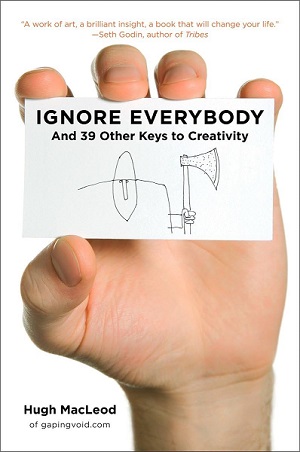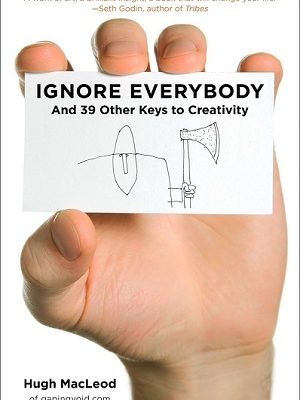Ignore Everybody: and 39 Other Keys to Creativity by Hugh MacLeod is a thought-provoking book that provides unique insights into nurturing creativity and finding success as a creative individual. MacLeod, known for his witty cartoons and insights on creativity, offers 40 lessons that challenge conventional wisdom and encourage readers to embrace their creative instincts. Below are the lessons from the book:

Read: Be Your Future Self Now
1. Ignore Everybody
- Lesson: Creativity is often met with resistance from others. MacLeod emphasizes that most people won’t understand your creative ideas, especially when they’re new or unconventional. The key is to ignore the naysayers and trust your own instincts. Creativity requires courage to pursue ideas even when others don’t see their value.
2. The Idea Doesn’t Have to Be Big
- Lesson: MacLeod argues that the size of the idea isn’t what matters; it’s the depth and authenticity. Small ideas can have a significant impact if they resonate deeply with an audience. Focus on the quality and authenticity of your ideas rather than trying to make them grandiose.
3. Put the Hours In
- Lesson: Creativity is not just about inspiration; it’s also about hard work. MacLeod insists that you need to put in the hours and be willing to work consistently on your craft. This dedication and perseverance are what ultimately lead to creative breakthroughs.
4. Good Ideas Have Lonely Childhoods
- Lesson: Creative ideas often face loneliness in their early stages. MacLeod highlights that many good ideas aren’t immediately recognized or supported. Creators must be patient and nurturing as their ideas develop, often in isolation before they gain recognition.
5. If Your Business Plan Depends on Suddenly Being “Discovered” by Some Big Shot, Your Plan Will Probably Fail
- Lesson: Relying on external validation or being “discovered” is a flawed approach. MacLeod advises that success in creativity comes from consistent work and self-driven progress rather than waiting for someone else to recognize your talent.
6. You Are Responsible for Your Own Experience
- Lesson: Creatives must take ownership of their journey and experiences. MacLeod underscores that no one else can dictate your creative path or outcomes. It’s up to you to create, learn, and grow from your experiences.
7. Everyone Is Born Creative; Everyone Is Given a Box of Crayons in Kindergarten
- Lesson: Creativity is inherent in everyone, but it often gets stifled over time. MacLeod encourages rediscovering and nurturing the innate creativity we all had as children. Creativity isn’t lost; it’s just forgotten and needs to be reawakened.
8. Keep Your Day Job
- Lesson: MacLeod advises creatives to maintain a steady source of income while pursuing their creative passions. This provides financial stability and allows creativity to flourish without the pressure of immediate financial success.
9. Companies That Squash Creativity Can No Longer Compete
- Lesson: In the modern business world, creativity is a competitive advantage. MacLeod asserts that companies must foster creativity among employees to stay competitive. Stifling creativity leads to stagnation and eventual decline.
10. Everybody Has Their Own Private Mount Everest They Were Put on This Earth to Climb
- Lesson: Each person has their own unique challenges and creative journey. MacLeod encourages embracing this journey, no matter how daunting it may seem. Your creative path is yours alone, and it’s essential to keep climbing, even when it’s difficult.
11. The More Talented Somebody Is, the Less They Need the Props
- Lesson: Truly talented individuals rely less on external props or validation. MacLeod explains that as one’s talent and confidence grow, there’s less need for external reinforcement or superficial aids. Talent speaks for itself.
12. Don’t Try to Stand Out from the Crowd; Avoid Crowds Altogether
- Lesson: Instead of trying to differentiate yourself within a crowd, MacLeod advises finding your own unique space. Creativity thrives in originality and independence, away from the noise of the crowd.
13. If You Accept the Pain, It Cannot Hurt You
- Lesson: Pain and rejection are part of the creative process. MacLeod suggests that by accepting these challenges as inherent to creativity, they lose their power to derail you. Embracing the pain allows for greater creative freedom.
14. Never Compare Your Inside with Somebody Else’s Outside
- Lesson: MacLeod warns against comparing your internal struggles with others’ outward appearances. Everyone’s creative journey is different, and comparisons can be misleading and demotivating.
15. Dying Young Is Overrated
- Lesson: The romanticized idea of the tortured artist who dies young is not a model to aspire to. MacLeod advocates for a sustainable creative life where long-term growth and well-being are prioritized over self-destructive behavior.
16. The Best Way to Get Approval Is Not to Need It
- Lesson: Seeking approval can stifle creativity. MacLeod emphasizes the importance of creating for yourself rather than for the approval of others. True creativity comes from within and doesn’t rely on external validation.
17. Power Is Never Given; Power Is Taken
- Lesson: Creative power must be claimed, not passively received. MacLeod asserts that waiting for permission or power to be granted is a mistake. Instead, take control of your creative destiny and assert your power.
18. Don’t Worry about Finding Inspiration; It Comes Eventually
- Lesson: Inspiration is not something you need to actively seek out; it will come naturally as you work. MacLeod encourages creatives to focus on the process and trust that inspiration will follow.
19. You Have to Find Your Own Schtick
- Lesson: Every creative person needs to find their unique style or “schtick” that sets them apart. MacLeod advises against copying others and instead encourages finding and developing your own unique voice.
20. Write from the Heart
- Lesson: Authenticity is key in creativity. MacLeod stresses the importance of writing (or creating) from the heart, as genuine emotion resonates more deeply with an audience than anything contrived.
21. The World Is Changing
- Lesson: The world is constantly evolving, and so should your creativity. MacLeod highlights the importance of adapting to change and staying relevant in a rapidly changing world.
22. Meaning Scales, People Don’t
- Lesson: Meaningful work can scale and reach a large audience, but people’s capacity doesn’t. MacLeod emphasizes the importance of focusing on work that scales and impacts many, rather than overextending oneself.
23. Don’t Worry about Finding Your Soulmate
- Lesson: MacLeod suggests that the quest for a “soulmate” in creativity or life can be a distraction. Instead of fixating on finding that perfect creative or life partner, focus on personal growth and creative pursuits. The right connections and partnerships will emerge naturally when you’re on the right path.
24. Making a Living and Doing What You Love Are Not the Same Thing
- Lesson: There’s a difference between making a living and following your passion. MacLeod points out that not every creative endeavor needs to be monetized. Sometimes, doing what you love without the pressure of making it your livelihood allows for greater creative freedom and satisfaction.
25. Worrying about “Commercial vs. Artistic” Is a Complete Waste of Time
- Lesson: The debate between commercial success and artistic integrity is irrelevant, according to MacLeod. What matters is doing the work that resonates with you, regardless of whether it fits into a commercial or artistic category.
26. Don’t Worry about the “Good Old Days”
- Lesson: Nostalgia for the past can be a trap. MacLeod advises that instead of longing for the “good old days,” focus on the present and the opportunities it presents. Creativity thrives in the now, not in the past.
27. You Have to Start Somewhere
- Lesson: Every creative journey begins somewhere, often in a humble or unexpected place. MacLeod emphasizes that waiting for the perfect conditions to start is a mistake. The key is to begin where you are with what you have.
28. If You Have to Compromise, Compromise Up
- Lesson: If compromise is necessary, aim to compromise in a way that elevates your work rather than dilutes it. MacLeod suggests that when faced with creative compromises, seek solutions that enhance the quality or impact of your work.
29. Be Nice. Be Professional. Be Selfish.
- Lesson: MacLeod advises a balanced approach to creativity that includes being kind, maintaining professionalism, and being selfish about protecting your creative time and energy. Self-care and boundaries are essential for sustained creativity.
30. Beware of Turning Hobbies into Jobs
- Lesson: Turning a hobby into a job can sometimes kill the joy it brings. MacLeod warns that when hobbies become monetized, they often lose their original sense of fun and creativity. It’s essential to maintain a balance between work and play.
31. Write Your Own Script
- Lesson: Creators should take control of their own narratives and not rely on others to dictate their story. MacLeod encourages writing your own script in life and creativity, taking charge of your journey, and creating your path.
32. There’s No Such Thing as Writer’s Block
- Lesson: MacLeod dismisses the idea of writer’s block, suggesting it’s an excuse rather than a real barrier. He believes that creators can always find something to work on, even if it’s not perfect. The key is to keep creating, regardless of obstacles.
33. Doodling Is Good for You
- Lesson: Engaging in seemingly trivial creative activities, like doodling, can be beneficial. MacLeod argues that such activities stimulate creativity and provide a mental break, helping to refresh your creative energy.
34. Create with a Sense of Urgency
- Lesson: Creativity should be pursued with urgency, as if time is limited. MacLeod stresses that waiting for the “right moment” often leads to missed opportunities. Acting with urgency can lead to more prolific and impactful creative work.
35. You Can’t Make Everybody Happy
- Lesson: Trying to please everyone is a recipe for creative failure. MacLeod encourages focusing on creating work that resonates with you and your intended audience, rather than trying to appeal to everyone.
36. Art is Theft
- Lesson: MacLeod suggests that all creativity involves some level of “theft,” meaning drawing inspiration from existing works. The key is to borrow creatively, making something new and original from what you’ve taken.
37. Keep Moving Forward
- Lesson: Creativity is a continuous journey that requires momentum. MacLeod advises against resting on your laurels or becoming complacent. Keep pushing forward, learning, and growing.
38. Work Harder
- Lesson: There’s no substitute for hard work in creativity. MacLeod emphasizes that the most successful creatives are those who work the hardest. Talent alone isn’t enough; it must be paired with relentless effort.
39. Your Job Is to Create
- Lesson: At the end of the day, your primary responsibility as a creative person is to create. MacLeod reminds us that all the other aspects—marketing, networking, etc.—are secondary. The main focus should always be on producing creative work.
40. Human Beings Have No Meaning Except as Creators
- Lesson: MacLeod concludes with the idea that our purpose as humans is fundamentally tied to our ability to create. Creativity is what gives life meaning and purpose, and embracing this role is key to fulfillment.
Conclusion
These lessons from Ignore Everybody: and 39 Other Keys to Creativity by Hugh MacLeod offer valuable insights into nurturing and protecting your creativity in a world that often tries to stifle it. By internalizing these lessons, you can better navigate the creative process and achieve greater satisfaction and success in your creative endeavors (Amazon).



